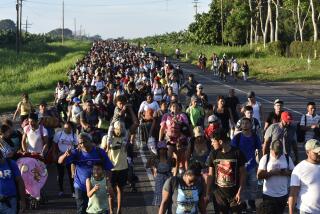A new kind of victim
MORELIA, MEXICO — Gloria Alvarez never got to shout “Viva Mexico!”
The 32-year-old homemaker, cradling her infant son, jostled with the rest of her family and thousands of other people who packed the center of this colonial-era city Monday night to celebrate Mexican Independence Day.
Then came the blasts. Alvarez’s husband and 7-year-old daughter were seriously injured. The 3-month-old baby, Uriel, somehow escaped unharmed, but Alvarez, gravely wounded, died later in a public hospital.
The devastated family was among many people in Mexico reeling Wednesday from what many considered an escalation in the vicious violence that has been racking the nation for months.
Twin grenade attacks on the dense, celebrating crowd, on a major holiday and in the Mexican president’s hometown, killed at least seven people, wounded scores and sowed panic among a population already unnerved.
Mexican authorities on Tuesday blamed organized crime for the blasts in Morelia, the capital of Michoacan, a western state with a long history of drug trafficking. In the 21 months since Mexican President Felipe Calderon declared war on Mexico’s powerful drug-smuggling networks, this was the first time civilians had been directly and indiscriminately targeted. And Mexicans were forced to confront a new kind of victim amid rising fears that, now, anyone is fair game.
People like Alvarez.
Her husband, Rafael Bucio, lay in his hospital bed Wednesday, the bones of a shattered arm and leg held in place by pins, and sought to understand what was happening to his country.
A parking attendant, Bucio, 30, said he recalled seeing an object fly past and strike a police car. It bounced off and rolled to within 6 feet of his family. Bucio had but a moment to identify the rolling object.
“When it stopped, I realized it was a grenade,” he said.
He tried to gather up his family, but it was too late. All were knocked to the ground. His daughter, Jannyfer, screamed, “Papa, help me!” Her face was covered with blood. His wife lay motionless.
Five of the seven people killed were women. Most of the victims were from humble families for whom open-air town square celebrations are major social events.
Mexican troops Wednesday roped off the quaint central plaza and stood guard under Mexican flags and leftover holiday red-green-and-white bunting. Bloody shoes, ripped clothing and broken glass littered the paving stones where the injured had writhed in pain. Stunned citizens brought flowers and arranged candles in the shape of a cross, as hasty shrines.
“We are reaching a very extreme level of violence that we’ve never seen before,” said Ordulia Castro, a 39-year-old nurse. “They are killing innocents. This isn’t going to stop here. It’s going to continue until we are in a guerrilla war, just like Colombia.”
Some people compared Monday night’s violence to a Mexican version of the Sept. 11 attacks in the U.S. -- smaller, surely, but the kind of event that has the potential to change Mexico. Several of the survivors suffered horrific wounds and underwent multiple amputations.
“Mexicans have always been very happy. With this, it could change the attitude of people. It could make us more cold,” said Rodolfo Chavez, a 44-year-old education researcher. “Nobody could ever have imagined this.”
Mexican authorities circulated a composite sketch of a chubby man dressed in black who several witnesses reported seeing tossing a fragmentation grenade and begging for forgiveness.
Michoacan Gov. Leonel Godoy promised a “profound and exhaustive” investigation.
No arrests have been reported.
Michoacan has had a front-row view as the drug war has spread nationwide. Two years ago, gunmen in the city of Uruapan dumped five human heads onto the floor of a dance hall, auguring a wave of drug-hit beheadings that has only worsened.
Calderon chose Michoacan as the first place to send troops when, as a newly elected president, he announced his crusade against drug traffickers in December 2006.
On Wednesday, Calderon interrupted his scheduled activities to travel to Morelia.
“The sad events in Morelia,” he said before heading here, “have sent the nation into mourning and demonstrate that the criminals act not only against the government but against society.”
Bucio lay in his hospital bed, while his relatives arranged the cremation of his wife’s remains. He hadn’t yet broken the news of her death to Jannyfer, who was in a bed four floors above.
“Who knows where all this will end,” he said. “I think maybe we are only at the beginning.”
--
More to Read
Sign up for Essential California
The most important California stories and recommendations in your inbox every morning.
You may occasionally receive promotional content from the Los Angeles Times.










